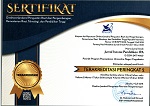Digital Citizenship in Indonesia: Digital Literacy and Digital Politeness Using Social Media
Abstract
This study aimed to describe the basis for strengthening global citizenship and increasing digital literacy in Indonesian society. This study used a qualitative approach with a descriptive type. The collection of primary data sources included books, scientific journals, manuscript publications, and internet news media using literature study techniques. The data obtained were analyzed using interactive techniques from Miles and Huberman. The results of the study showed that strengthening global citizenship was based on two aspects, namely digital literacy and digital ethics. Digital literacy was needed to improve people's ability to utilize technology supported by digital ethics. People's ability to understand information in the digital world was increasing with evidence of being able to distinguish between good material for consumption and information that must be avoided.
Keywords
Full Text:
PDFReferences
Bawden, D. (2001). Information and digital literacies: a review of concepts. Journal of documentation. 22(1), 56-63.
Bawden, D. (2008). Origins and concepts of digital literacy. Digital literacies: Concepts, policies and practices, 30(2), 17-32.
Buckingham, D. (2010). Do We Really Need Media? Digital content creation: Perceptions, practices, & perspectives, 46, 287.
CNN. (2021). Pakar Bongkar Kekuatan Jari-jari Netizen Bisa Berdampak ke RI. https://www.cnnindonesia.com/teknologi/20210324161205-185-621649/pakar-bongkar-kekuatan-jari-jari-netizen-bisa-berdampak-ke-ri
CSE. (2016). Common Sense on Cyberbullying. In the Family Tip Sheet. Common Sense Education.
Gleason, B., & von Gillern, S. (2018). Digital citizenship with social media: Participatory practices of teaching and learning in secondary education. Educational Technology and Society, 21(1), 200–212.
Harahap, N. (2014). Penelitian Kepustakaan. Jurnal Iqra’, 8(1), 68–73.
Ikhsan, M.. (2021). Riset: Netizen di Indonesia Paling Tak Sopan se-Asia Tenggara. https://www.cnnindonesia.com/teknologi/20210225115954-185-610735/riset-netizen-di-indonesia-paling-taksopan-se-asia-tenggara
Isman, A., & Canan Gungoren, O. (2014). Digital citizenship. Turkish Online Journal of Educational Technology, 13(1), 73–77. https://doi.org/10.23956/ijarcsse.v8i5.606
Kuntarto, E. (2016). Kesantunan Berbahasa Ditinjau Dari Perspektif Kecerdasan Majemuk. Jurnal Ilmiah Universitas
Batanghari Jambi, 16(2), 58-73.
Lakoff, G. (1990). Some empirical results about the nature of concepts. https://escholarship.org/uc/item/63v3h67m
Lankshear, C., & Knobel, M. (Eds.). (2008). Digital literacies: Concepts, policies and practices (Vol. 30). Peter Lang.
Ikhsan, M.. (2021). Riset: Netizen di Indonesia Paling Tak Sopan se-Asia Tenggara. https://www.cnnindonesia.com/teknologi/20210225115954-185-610735/riset-netizen-di-indonesia-paling-taksopan-se-asia-tenggaraMicrosoft. (2018). Fostering Digital Citizenship. http://www.oaesv.org/wp- content/uploads/2013/02/Fostering_Digital_Citizenship.pdf
Melfianora, M. (2019). Penulisan Karya Tulis Ilmiah Dengan Studi Literatur. Open Science Framework, 12(1), 14-26.
OECD. (2021). 21St Century Children As Digital Citizens. OECD Publications Service.
Pradana, Y. (2018). Atribusi kewargaan digital dalam literasi digital. Untirta Civic Education Journal, 3(2).
Reichert, R., Wenz, K., Abend, P., Culture, D., Dcs, S., & Citizens, I. D. (2019). Digital Citizens. Digital Culture and Society,
(1), 1–35. https://doi.org/10.14361/
dcs-2018-0202
Ribble. (2014). Nine Themes of Digital Citizenship. Http://Www.Digitalcitizenship.Net/Nine_Elements.Htm.
Ribble, M., & Bailey, G. (2007). Digital Citizenship in Schools. ISTE.
Richardson, J., & Milovidov, E. (2019). Digital Citizenship Education Handbook. In Council of Europe. Council of Europe Publishing.
Rosa, M. C. (2022). Penyebab Netizen Indonesia Disebut Paling Tidak Sopan se-Asia Tenggara. https://www.kompas.com/wiken/
read/2022/03/26/110500081/penyebabnetizen-indonesia-disebut-paling-tidaksopan-se-asia-tenggara?page=all
Siregar, A. Z., & Harahap, N. (2019). Strategi dan Teknik Penulisan Karya Tulis Ilmiah dan Publikasi (Vol. 148). Penerbit Deepublish.
Suherdi, D. (2021). Peran literasi digital di masa pandemik. Cattleya Darmaya Fortuna.
UNESCO. (2015). Fostering Digital Citizenship through Safe and Responsible Use of ICT. In U. B. APEID-ICT (Ed.), UNESCO Bangkok (A
review o). UNESCO Bangkok, Asia and Pacific Regional Bureau for Education
DOI: http://dx.doi.org/10.17977/um019v7i3p628-637
Refbacks
- There are currently no refbacks.
Copyright (c) 2022 Jurnal Ilmiah Pendidikan Pancasila dan Kewarganegaraan

This work is licensed under a Creative Commons Attribution 4.0 International License.
View My Stats










